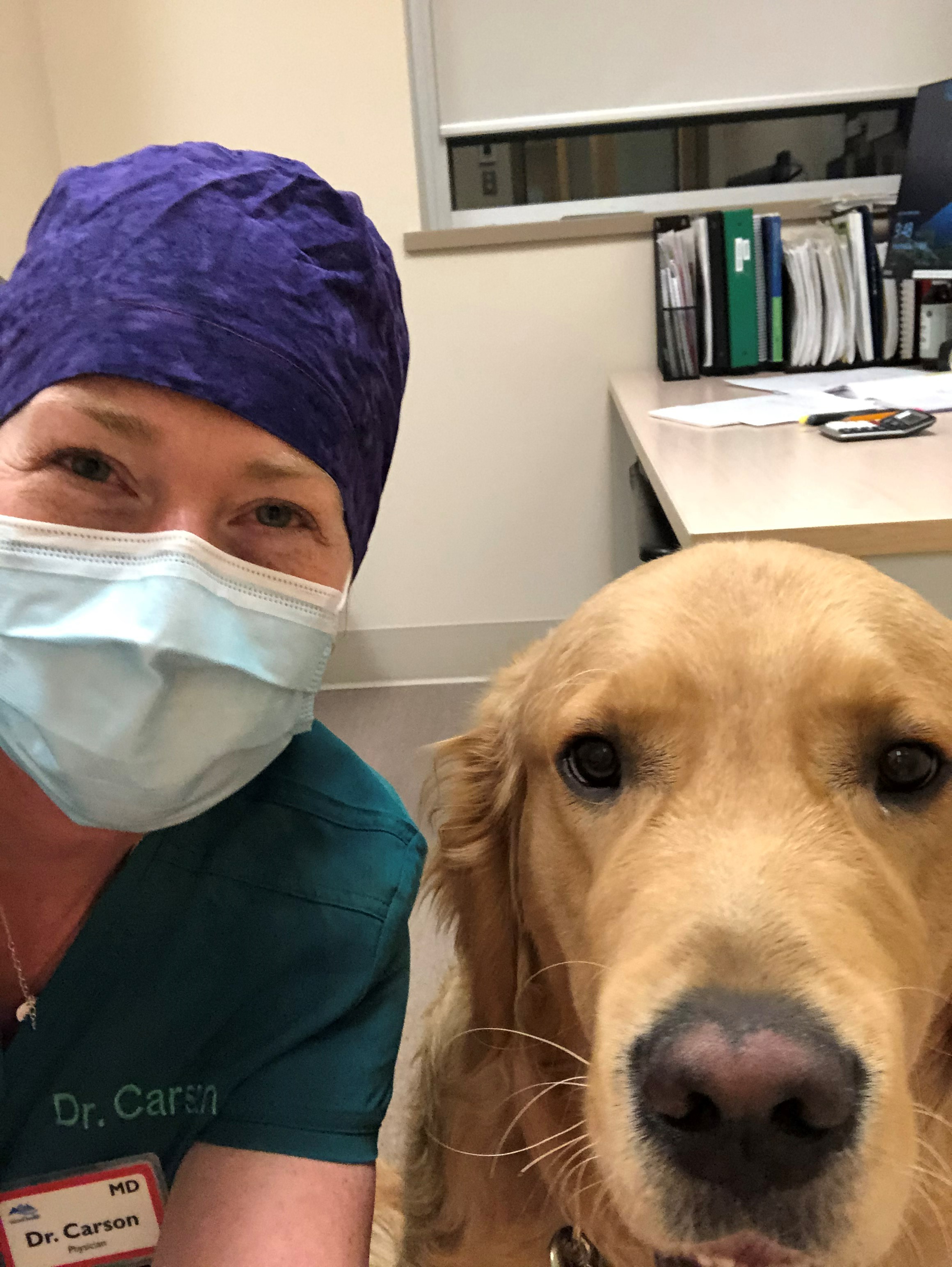Posted on: March 8, 2023
Nephrology and Internal Medicine, NRGH
Dr. Rachel Carson grew up in Ottawa but had always wanted to move out to the coast and a visit to UBC during high school helped put her on that path. She did her first degree in chemical engineering at McGill, followed by her MD in Kingston at Queens, finishing in 1999.
chemical engineering at McGill, followed by her MD in Kingston at Queens, finishing in 1999.
Carson and Atlas, right.
After that, she did one of the last old-school “general internships" in Victoria, followed by Internal Medicine at UBC in Vancouver. Upon completion came her Nephrology fellowship in London, Ontario at Western U, and finally a stint doing research in London, England which included navigating “The Tube" while pregnant. After all of that, she settled on Nanaimo and is so grateful to live in this beautiful place on the traditional territories of the Snuneymuxw people.
Why did you go into the field of medicine?
I originally trained to be a chemical engineer for my first degree but found that it lacked human interaction, so I switched paths and enrolled in medical school instead. An engineer may clean up a river and help thousands of people, but you don't get to talk to people. Medicine has allowed me to engage in complex scientific work while still interacting with people.
I wanted to become a family doctor. I saw it as holistic, whole person care, with a lot of personal interaction but I found family medicine was really difficult and not quite the right match for me. Being a good family physician is one of the hardest jobs in medicine. I eventually shifted to Nephrology, which provides me with the perfect mix of science, mathematics, human interaction and end-of-life care.
Is there any particular accomplishment that you are most proud of with regards to your work?
I am proud to have led the early development of the NRGH renal services. From 2008 to 2015, we have grown from nothing to provide a kidney care clinic, hospital hemodialysis service, home dialysis and kidney transplant services. I was the Nephrology site chief for NRGH until 2012. I am a member of the Clinical Faculty at UBC and I have additional Quality Improvement training through the BC Clinician Quality Academy. Currently, I am the Physician Lead in Island Health for the 'Expressed, Heard, and Respected' portfolio, also known as Advance Care Planning/MOST. This work is deeply meaningful to me and that meaning has sustained me during the darkest days of my career.
It is really about figuring out what matters most to patients and helping to ensure that the care we provide matches with their values priorities and this is particularly important close to the end of life. The work we are doing in Island Health to create infrastructure and make this kind of communication the standard across all our sites is ground-breaking.
I also teach about advance care planning and palliative renal care regularly, having authored one of the earliest research papers on conservative (non-dialysis) support of end stage renal disease during my time in the UK. Finally, I'm proud that my “pandemic project" has been to train and certify my dog Atlas to be NRGH's therapy dog. He comes with me to clinic and on hospital rounds and many times has helped patients, families and staff at NRGH, being true to his name by taking the worries and burdens off their shoulders and putting them on his. He brings lightness to dark days and is particularly skilled at getting rid of those worries on our behalf, throwing them off to roll in the grass or the snow with pure joy.
How do you manage work/life balance?
I'm laughing because I don't think I do. That is an elusive prospect. Better boundaries and focused attention are things that I'm working on to see if I can change that.
What is your favourite way to decompress after a busy day of work?
Sometimes I need to decompress during a busy day of work, and my dog Atlas is my best friend for that. At home I am working my way through playing (and singing) Joni Mitchell's album “Blue", which turned 50 the same year I did.
What does Canadian Women's Physician Day mean to you?
That's a hard question to answer. I just returned from a 10 day silent meditation retreat for health care professionals and most (10 out of 12 inspiring people there) were women. I think there is a lot of work to do to help physicians heal.
I was so proud to see my fellow women physicians doing that work, but also a bit sad not to see more of my male colleagues there as well. At a different retreat in 2017, the following piece came pouring out of me and I think it still speaks strongly to parts of the experience of being a female physician: https://www.cwimorg.com/post/tall-poppies